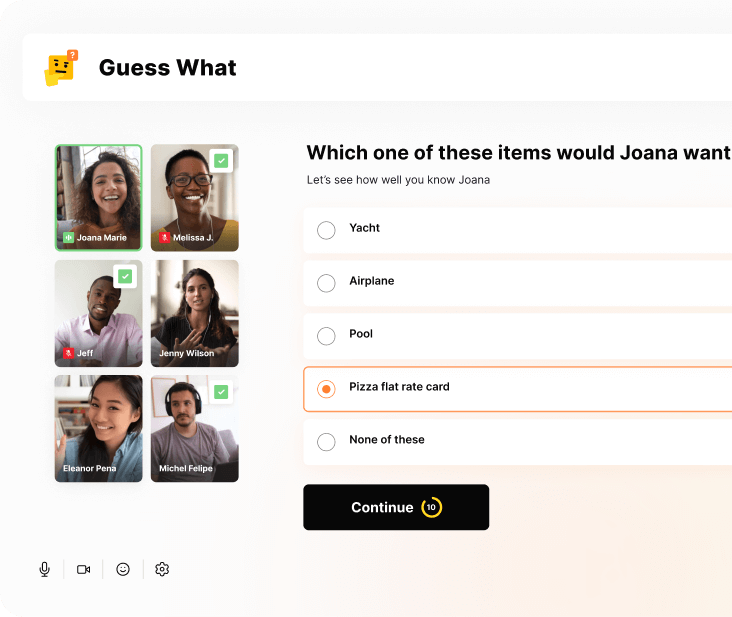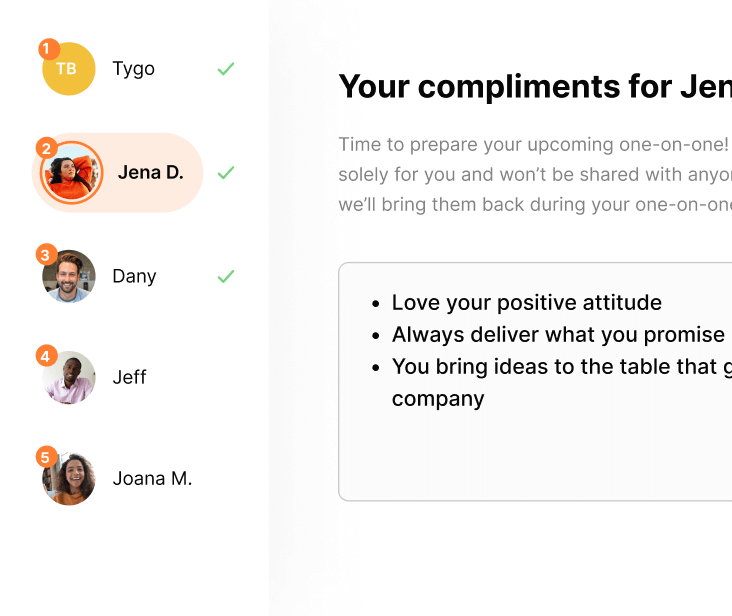Back to Blog
4 research-backed drivers of employee engagement in 2023
Improving employee engagement is no easy feat. Yet, the rewards - increased productivity, profits, and employee retention - are always worth organizational efforts.
We looked at the top four employee engagement drivers identified by the Employee Expectations Study (Workday Inc, 2021). The study analyzed data from 19 million comments shared by nearly 1.8 million employees across over 1,000 companies.
For more insight into boosting employee engagement, see our blogs on employee engagement statistics and best employee engagement apps.
Share fun facts and bond with a team quiz
Have your participants choose from a list of questions they’d like their coworkers to answer about them, before watching as they guess the right answer.
01. Yes
share-fun-facts-and-bond-with-a-team-quiz

Run a guided recognition activity
Have your participants choose from a list of questions they’d like their coworkers to answer about them, before watching as they guess the right answer.
01. Yes
run-a-guided-recognition-activity

Organize a virtual cooking class
Hire a professional chef to help your team cook a delicious lunch or dinner. May be difficult for co-workers with families. To find providers and get tips, read our blog about virtual cooking classes.
02. No
organize-a-virtual-cooking-class

Hire a stand-up comedian
Have your participants choose from a list of questions they’d like their coworkers to answer about them, before watching as they guess the right answer.
02. No
hire-a-stand-up-comedian

No items found
No items found
Table of contents
Improving employee engagement is no easy feat. Yet, the rewards - increased productivity, profits, and employee retention - are always worth organizational efforts.
We looked at the top four employee engagement drivers identified by the Employee Expectations Study (Workday Inc, 2021). The study analyzed data from 19 million comments shared by nearly 1.8 million employees across over 1,000 companies.
For more insight into boosting employee engagement, see our blogs on employee engagement statistics and best employee engagement apps.
The four key drivers of employee engagement
1. Flexible working
Remote working, work-life balance, and the opportunity to fulfill caregiving responsibilities are primary concerns for employees across the globe. 76% of employees did not want to return to full-time office work after the pandemic, according to Future Forum.
While remote working isn’t possible for all employees, flexible working is. When you give employees more control over their working schedule, you help alleviate workload pressures, which improves employee experience, well-being, and in turn, performance.
2. Growth
A sense of progression is vital for many employees. 8% of all employee comments related to the opportunity for career development, promotion, and training. When staff can’t see a clear career path ahead, they’ll likely look elsewhere for opportunities to support their potential—making growth essential to employee retention.
3. Belonging & diversity
2020 was a catalyst for conversations around belonging & diversity (B&G). 11% of all employee comments were concerned about inclusion, equity, race, gender, sexuality, disability, identity, and discrimination. It’s an area likely to have significant importance for the foreseeable future.
The research found that millennials & Gen Z employees were particularly likely to expect a diverse and inclusive workplace.
4. Environmental, social & governance practices
According to the World Economic Forum, employees are 3x more likely to stay at a purpose-driven organization. Millennial employees are most likely to lead the conversation around ESG and are more likely to voice opinions regarding social issues within your organization. Gen-Z is also well-presented, with the importance of ESG to continue growing.
Committing to ESG issues not only honors employee values and helps create a strong brand proposition, but it also lowers operating costs and provides a higher return on investment.
How to apply these employee engagement drivers to your business
1. Supporting flexible working
- Encourage autonomy - Give employees more control and choice whenever possible. Whether it’s working hours or their working environment, let them decide how, where, and when they work.
- Provide training - Core competence is vital when flexible working is in place. Keep your employees trained to help them stay happy and effective when out of the office.
- Treat employees fairly - Ensure employees are not restricted by where they choose to work. This includes ensuring they have the right resources in and out of the office.
- Communicate often - Keep employees up-to-date with what’s happening, what resources are available, and the expectations they need to meet when working flexibly. You can make sure communication lines are open for teams & managers with the right virtual employee engagement platform, making collecting feedback more straightforward.
2. Nurturing growth
- Providing training for managers - Upskill your managers, so they have the tools to support growth continually. Skills might include coaching, listening, and holding space for regular development conversations with their employees.
- Work out what growth means to your team - You can’t develop growth if you don’t know what that means to each individual. Have conversations about what it looks like to each member. How can you help them reach career development milestones with tailored learning and goals?
- Support cross-teams cohesion - Keep communication open. Provide opportunities for honest feedback. And get the right solutions to engage teams on topics like social styles, communication, emotional intelligence, and building resilience. Again, investing in an employee engagement solution is a helpful way to do this.
- Reward opportunities - Ensure your employees know how they can get involved with growth opportunities and the rewards for progressing. If promotions are available, be transparent about salaries and compensation packages.
3. Creating belonging & diversity
- Prioritize psychological safety - A sense of workplace safety is crucial to creating a sense of belonging that boosts engagement. This looks like an environment where feedback is respected and diversity is embraced. For more on psychological safety, we recommend this guide.
- Examine unconscious bias in your practices - Be aware of the ‘norms’ in your business practice. Be open to changing how you do things to support different team members and their needs. Read more about unconscious bias here.
- Support internal networks - Yep, communication is vital again! Employee resource groups are an effective way to bring people together and help break down barriers.
- Be held accountable - Make your B&D commitments known throughout your company. Clarify what steps people can take to hold you accountable to them.
4. Shaping ESG practices
- Make ESG commitments visible - As with your B&D commitments, make sure people know your ESG values.
- Ask employees for ideas - Gather feedback from your staff on how they want to contribute to the causes that matter to them. Act upon them where possible. It’s another way to show your employees their concerns are valued.
- Talk about your ESG values more - Make your ESG values part of ongoing dialogues so people know how they impact practices. Consider a quarterly newsletter to keep employees updated on meeting commitments.
So, what employee engagement drivers do you need to work on next? If creating a sense of belonging is high on your priorities, Gomada is here for you. Explore our online platform supporting teambuilding online today.
Subscribe to get our latest updates
Subscribe to get our latest updates
%20(1)-p-500.webp)





